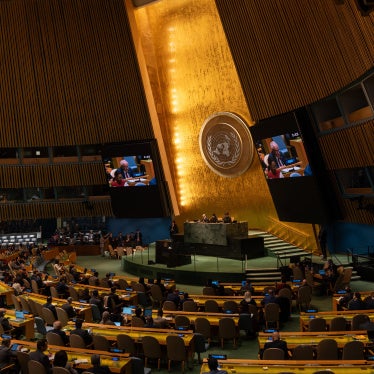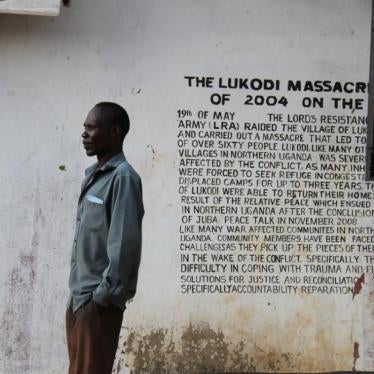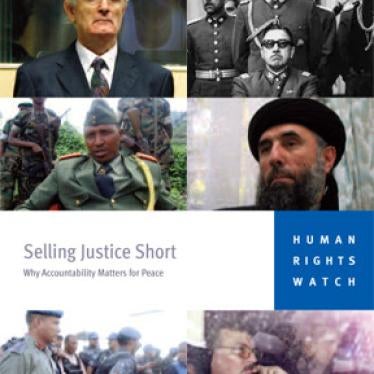Mr. Christian Wenaweser
President
Assembly of States Parties
International Criminal Court
Dear Mr. President,
In advance of the January 2009 election of six new judges to the International Criminal Court (ICC), Human Rights Watch writes to request your assistance in ensuring the election of the most highly qualified candidates.
Ensuring Nominations Are Adequately Supported
Human Rights Watch welcomes the emphasis placed by the Assembly of States Parties on "the importance of electing the most highly qualified judges in accordance with article 36 of the Rome Statute" in the omnibus resolution adopted during the recent Assembly session in The Hague (ICC-ASP/7/Res.3, paragraph 12).
We attach the greatest importance to the election of the most highly qualified candidates in January. As the ICC develops, the bench will be an essential part of building the court's credibility. These six new judges will be elected to nine-year terms and will greatly influence the work of the ICC for many years. States parties, in turn, as the nominators and electors of judges, have the greatest opportunity to influence the success of the court by providing it with the best possible bench.
As you know, according to the Rome Statute and paragraph 7 of resolution ICC-ASP/3/Res.6 setting out the judicial election procedure, a state party is required to support its nomination of a candidate with a statement of that candidate's qualifications. The statement of qualification should:
- Describe how the candidate fulfils the various requirements set out in article 36(3) of the Rome Statute, including the candidate's qualification in his or her state for appointment to the highest judicial offices and the candidate's competency in either criminal or international law;
- Indicate whether the candidate is being nominated for inclusion in List A (criminal law expertise) or List B (international law expertise);
- Provide information that would permit states parties to take into account the need within the membership of the court for the representation of the principal legal systems of the world, equitable geographic representation, fair representation of male and female judges, and legal expertise on specific issues including violence against women and children; and
- Indicate under which nationality the candidate is being considered, where a candidate is a national of two or more states.
After review of the ICC website to which the candidates' resumes and statements of qualification are posted, it appears that the statements do not always set forth the information requested under the election procedure.
Nominating states tend to fail to explain how their candidates qualify for appointment to the highest national judicial offices, for example, by specifying the requirements for such appointment. Information regarding the fluency of the candidate in a working language of the court and the legal system with which the candidate is familiar is also generally lacking. We note that Belgium, Bosnia and Herzegovina, Colombia, Greece, Guyana, Italy, Japan, Kenya, The Netherlands, and Sierra Leone do not provide detailed information as to how their candidates qualify for inclusion in either List A or List B.
In several other cases-Benin, Burkina Faso, Madagascar, Senegal, and Zambia-no statement of qualification has been provided. Instead, only the curriculum vitae that customarily also accompanies nominations is available. While we welcome the large number of candidates from African countries and the high level of engagement of African states parties with the court that this reflects, their nominations should comply with the election procedure.
Requiring candidacies to be supported by statements of qualification provides states parties and civil society with the information necessary to help ensure the election of only the most highly qualified candidates. The failure to provide statements, or to provide statements that materially add to the information available from a candidate's curriculum vitae, is inconsistent with the prescribed election procedure. It detracts significantly from the transparency of elections and from the ability of states parties to cast informed votes.
Particularly in light of the importance identified above of a highly skilled bench to the court's credibility and effectiveness, Human Rights Watch asks the Bureau of the Assembly of States Parties to review the statements provided for each of the 21 nominees. Where statements are missing or lack the detail specified by the letter and spirit of paragraph 7 of the election procedure, the Bureau should request states to provide an additional statement sufficiently in advance of the January 2009 elections.
Use of Vote Trading During Elections
As you are aware, many elections at the United Nations and other international institutions have been characterized by "vote trading," where states agree to support one another's candidates with minimal regard to the individual's qualifications.
Vote trading over ICC positions could lead to the election of poorly qualified judges, and to a bench that will not be the most skilled and representative. At a time of increasing activity at the court, including the management of complex judicial challenges, this would certainly undercut the court's effectiveness and credibility. As indicated above, the Assembly itself recently recognized the importance of electing the most highly qualified judges. Vote trading is antithetical to this commitment.
Civil society expressed concerns about vote trading at the time of the 2003 election of ICC judges with some positive effect. States parties should build on their better practice and should be encouraged to do so by the Bureau. In advance of the January elections, we ask the Bureau to issue a note verbale to states parties discouraging the use of vote trading in ICC elections. We will be writing more on this issue closer to the time of the elections.
Thank you for your attention to these important matters.
Sincerely,
Richard Dicker
Director
International Justice Program
cc:
Mr. Jorge Lomonaco, Vice-President, Bureau of the Assembly of States Parties
Mr. Zachary D. Muburi-Muita, Vice-President, Bureau of the Assembly of States Parties
Members of the Bureau of the Assembly of States Parties







